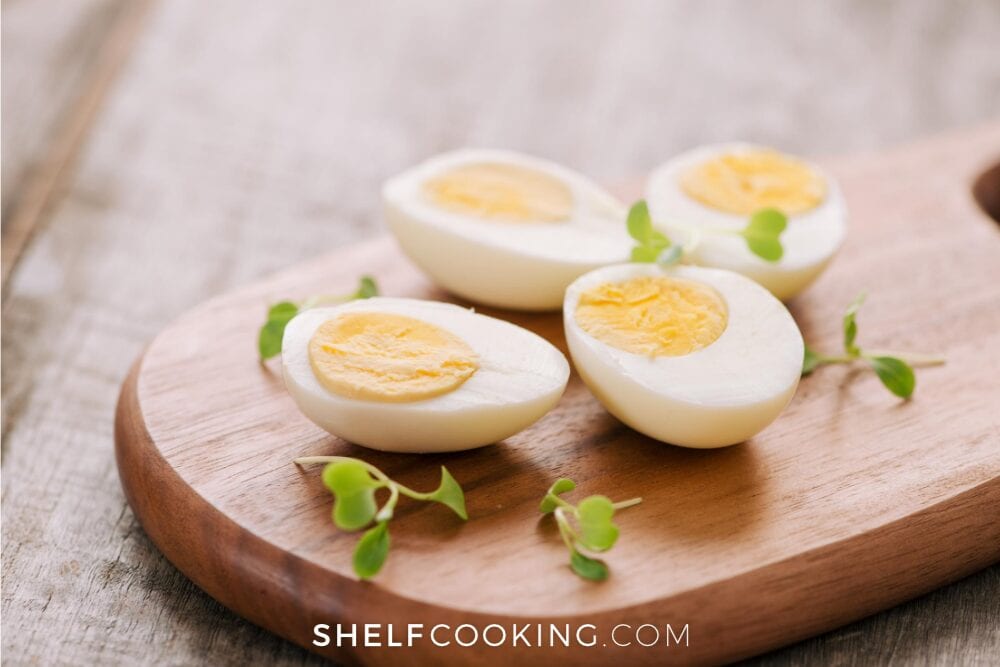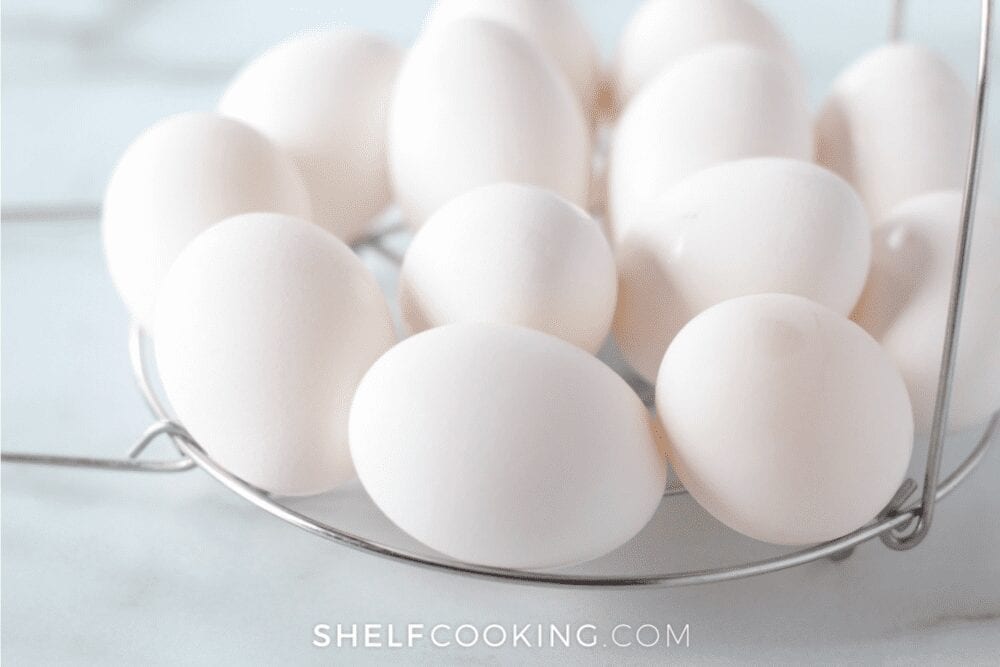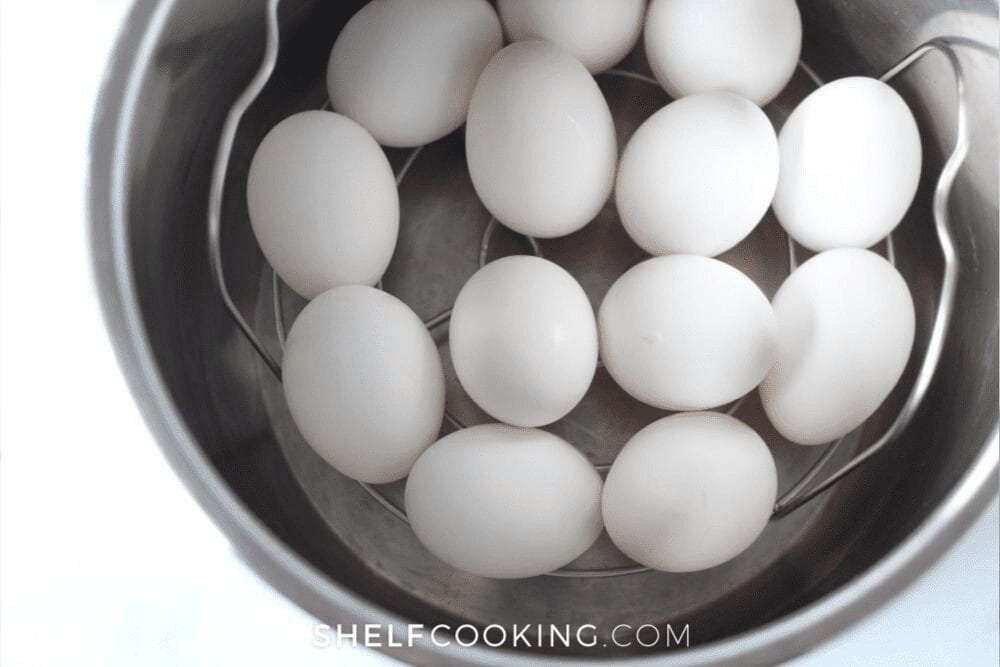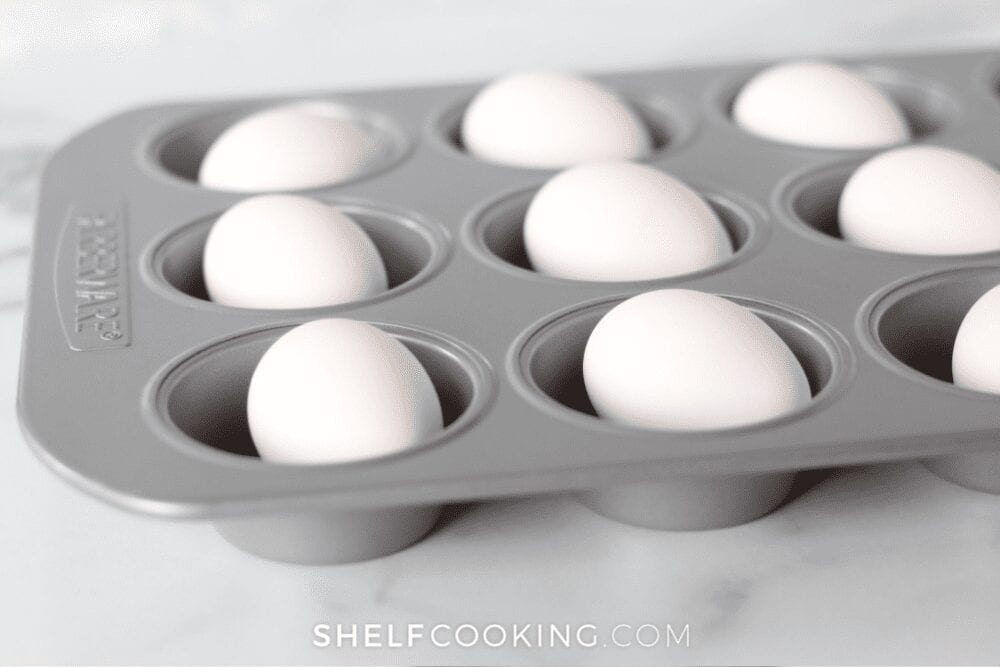Hard-boiled eggs are a shelf cooking staple! Keep reading for four quick, easy, foolproof ways to make the perfect hard-boiled egg! We’ll also share how to store hard-boiled eggs and how long they last.

Is there any food more versatile than an egg? Packed with protein and super affordable (score!), we use them all the time around here. If you’re looking for ways to make meals more filling or to keep grocery bills low as meat prices continue to climb, hard-boiled eggs are an MVP item for health and budget-conscious families.
*Note: When you click the links in this post, we may receive a commission at no extra cost to you.
Keep a batch of hard-boiled eggs stored in the fridge so you can top salads, make tasty sandwiches or just have a healthy snack option ready! At our house, we love to keep hard-boiled eggs in the snack drawer in our fridge so our kids can grab them for a quick snack on the go.
Tips & Tricks for Making the Perfect Hard-Boiled Eggs

While boiling an egg doesn’t seem like rocket science, perfecting the process can be tricky!
Raise your hand if you’ve ever tried to make a batch of deviled eggs only to find your ‘’hard-boiled’’ eggs were still super runny. (🤦♀️👋) Cracked eggs, broken shells, and peeling nightmares? We’ve all been there. Waiting, and waiting, and waiting for the pot of water to boil? Never again!
Ready to learn how to master the art of the hard-boiled egg? Let’s get to it. We love making hard-boiled eggs in the Instant Pot, in the oven, and even in the microwave! What's more, we'll show you how it's done!
Here are three of our favorite hacks for making no-mess, no-hassle, perfect hard-boiled eggs.
Hard-Boiled Eggs on the Stove
Cooking on the stove is the way many of us have learned to prepare hard-boiled eggs. Adding salt to the water helps keep the eggs from cracking while adding vinegar helps prevents egg whites from escaping during the boiling process.
Here’s how to make hard boiled eggs on the stove:
- Place your eggs in a pot in a single layer and cover the eggs completely, plus an inch or two. Add a pinch of salt. Optional: Add a teaspoon of vinegar.
- Bring water to a boil over high heat. Once your water has reached a rolling boil, reduce the heat to medium-high and set your timer to boil the eggs for 6-7 minutes.
- When the eggs have finished cooking, gently pour out the hot water and add ice water to the pan.
- Let the eggs cool for a few minutes, then peel, serve, store, and enjoy!
Instant Pot Hard-Boiled Eggs

Is there anything the Instant Pot can’t do?!
We love using ours to make lasagna, apple butter, and a wide variety of other tasty treats. We even use ours to sterilize baby bottles! (Yes, you read that right!) The possibilities are seriously endless. But did you know you can tap into the magic of the Instant Pot to make boiling eggs easier than ever? You sure can!
Here’s what you need to know about making perfect hard-boiled eggs in an Instant Pot. For some reason, eggs cooked in the Instant Pot are just easier to peel. Science? Must be! Whatever the reason, it’s stinking awesome, and best of all, this method is quick! Need a batch of ready to use boiled eggs in under 30-minutes? You’ll love using the Instant Pot.
Here’s how to make hard boiled eggs in the Instant Pot:
- Fill your inner pot with about one cup of water for a 6-quart pot. (You'll want about an inch of water.) If you’re using a larger pot, you’ll need 1.5 cups of cold water. Make sure the water is cold. That part is important!
- Place your eggs in the steaming rack. You can cook one, two, a dozen or more. It’s up to you! Most 6-quart pots can hold up to sixteen eggs.
- Close the lid and set the steam valve to “Sealing”. Set the cooking pressure to high, and set a timer for 4-5 minutes.
- Let the pressure release naturally for around five minutes. Then carefully flip the steam valve to “Venting” to quickly release the remaining pressure.
- Carefully open your pot, take out the eggs, and place them in a bowl of ice water.
- Let them soak for a few minutes, then peel, serve, store, and enjoy!
That’s it! So simple.
It’s hard to beat this method, but if you don’t have an Instant Pot readily available, then hack number two might be perfect for you.
How to Cook Hard-Boiled Eggs in the Oven

All you need to make perfect hard-boiled eggs in the oven is a muffin tin! That’s it! So easy, right? It really doesn’t matter what size muffin tin you use. Whatever you have on hand is fine.
This method takes a bit longer than the Instant Pot, but it’s truly a case of ‘’set it and forget it.’’ If you’re baking, meal prepping, or cleaning your kitchen, you can pop some eggs in the oven while you work. Within 30-minutes, you’ll have perfectly cooked hard-boiled eggs ready to go.
Here’s how to make hard boiled eggs in your oven:
- Preheat your oven to 325°F and then place your eggs in the cups of your muffin tin. If your oven tends to run cooler, you may want to bump the temp to 350°F.
- Once the oven is heated, place the filled muffin tins inside your oven and set your timer for 30 minutes.
- While the eggs cook, fill a large bowl with ice water.
- Remove eggs from the oven and place them in the ice water bowl. Let them soak for 5-10 minutes, then peel and enjoy!
That’s it! Next up, we’ll share an unconventional way to boil up a batch of eggs. It may sound crazy, but it works!
How to Boil Eggs in the Microwave (Yep, you can do that!)
What did people do before the microwave?! We don’t want to know.
Heating up leftovers, making mug cakes, popcorn, you name it – microwaves sure make shelf cooking (and life) a lot easier! And, as it turns out, microwaves can also help you make the perfect hard-boiled eggs. (Spoiler alert: it’s pretty dang easy)
Here’s how to make hard boiled eggs in your microwave:
- Make sure to poke a tiny hole in the bottom of each egg. We recommend using a clean safety pin or a thumbtack to do this. Poking a hole is essential because it keeps the egg from exploding in the microwave. Who wants to clean up that kind of mess?!
- Fill a medium to large-sized bowl with warm water, then add your eggs. Make sure the eggs are submerged in the water. Then, cover the bowl with a microwave-safe plate, and place the eggs in the microwave to cook at 50% power for four minutes.
- If you like your egg yolks a little on the runny side, you can immediately remove the eggs from the water as soon as they’re done microwaving. Otherwise, we like to let them sit for another minute or two.
- Then, either run the eggs under cold water or soak in an ice water bath for about five minutes. Afterward, peel and enjoy or store away for later.
Voila! You've just made yourself some perfect hard-boiled eggs in about ten minutes.
How Long Do Hard-Boiled Eggs Last?
Let’s say you make up a batch of egg salad and still have two or three eggs to use. Or maybe you just need a dozen deviled eggs, leaving you with a half a dozen unused hard-boiled eggs. How should you store the eggs? And how long will they keep?
In general, hard-boiled eggs keep well in the refrigerator. Keep them in a Rubbermaid container or a Ziplock bag, and be sure to write their use-by-date on the outside. Use them within one week.
Well, there you have it! You now know how to make hard-boiled eggs four different ways! What's your favorite way to eat a hard-boiled egg? Share it with us in the comments below!

Looking for a few unique ways to use all those perfect hard-boiled eggs? We have suggestions! Check out these recipes:
- These mason jar salad recipes are a must-try!
- We love these DIY Lunchables for Kids around here! Game-changer.
- They're the perfect make-ahead breakfast idea!
Egg-static!

In the Philippines, i remember growing up, we cook the egg in the rice cooker or pot while we cook our rice. Always comes out perfect. But tbh, i never tried that trick now that i’m an adult.
That’s amazing! Such a cool tip.